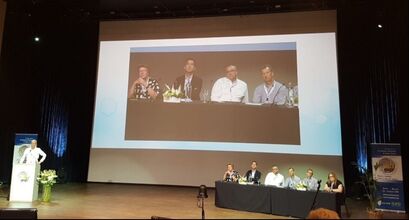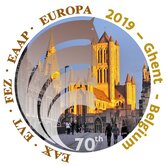EAAP FABRE-TP session 2019"Gene editing: Can we afford (not) to use precision technologies in livestock breeding?"
FABRE TP session on Genome editing was held on 28 August during EAAP 2019 in Ghent, Belgium. We welcomed speakers to discuss the techniques, opportunities and boundaries of Genome Editing in animal breeding, as well as current and potential future legal framework and ethics.
|

The large gap between the consumers' needs and animal genetics was mentioned by almost all of the speakers. Focusing on consumers’ perception and trust is very important, as animal breeding is a part of the food chain. New animal breeding technologies (NABT) are counted as GMOs by society, and farmers have concerns about applying NABT as they are unsure about their acceptance by consumers. Resistance to animal diseases is among the most important opportunities for genome editing techniques, as increasing disease resistance is directly related to animal health and increasing animal welfare. It was also mentioned by the speakers that according to the outcome of the animal welfare researches, consumers would be more supportive to gene editing if it can help to prevent animals suffering, to improve animal welfare, to eradicate diseases in livestock and reduces the usage of antibiotics in livestock. Engaging consumers, stakeholders and society in research issues right from the onset carry a lot of importance. It was underlined that innovation works better when scientists produce knowledge and collaborate with society.
The importance of a safe and modern regulatory framework was underlined to clean the pathway for commercialization. Regulations are running behind the innovations and the speed of governance should be tuned in with the speed of innovation. Legislative modernization is necessary for non-transgenes, a global view is needed and identifiable risks need to be regulated. Most importantly, political support is crucial to make regulation better adapted to GE.
The timing is now right to explain what animal breeding is and the importance to speak as one common voice as an industry. EFFAB/FABRE TP should continue, moving further coordinating actions at EU level. Also, breeding companies have to take part in the debate on their activities. The breeding sector is the most competent source to explain what animal breeding is and the tools that breeders use or could use in the future for a more sustainable livestock sector.
Read more about the EAAP FABRE-TP session in the FABRE-TP newsletter dedicated to this event
The importance of a safe and modern regulatory framework was underlined to clean the pathway for commercialization. Regulations are running behind the innovations and the speed of governance should be tuned in with the speed of innovation. Legislative modernization is necessary for non-transgenes, a global view is needed and identifiable risks need to be regulated. Most importantly, political support is crucial to make regulation better adapted to GE.
The timing is now right to explain what animal breeding is and the importance to speak as one common voice as an industry. EFFAB/FABRE TP should continue, moving further coordinating actions at EU level. Also, breeding companies have to take part in the debate on their activities. The breeding sector is the most competent source to explain what animal breeding is and the tools that breeders use or could use in the future for a more sustainable livestock sector.
Read more about the EAAP FABRE-TP session in the FABRE-TP newsletter dedicated to this event

